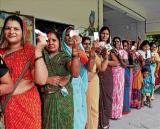
A thick security blanket has enveloped Bastar, even as Maoists triggered a blast in south Rajnandgaon on Sunday.
Meanwhile, the Congress hopes to pull the rug out from under the BJP’s feet to topple the government in the state.
As many as 18 seats, including Chief Minister Raman Singh’s constituency of Rajnandgaon, are going to the polls on Monday. But the spotlight is firmly on the 12 seats in Bastar, which made the difference in the last two Assembly polls.
In 2008, the BJP bagged 50 seats, while the Congress won 38 seats. In Bastar, the BJP won 11 out of the 12 seats with the sole exception of Konta, where the Congress’ Kawasi Lakhma emerged victorious.
In the first election to the state in 2003, the BJP wrested power from the Congress by winning 50 seats, while the Congress could manage only 37. In Bastar, the equation was 9:3 in favour of the BJP.
Both parties, therefore, are fighting hard this time in Bastar, where the shadow of Maoist violence and caste are determining factors.
“On Sunday, 35 kg of explosives were recovered in Maad areas across the river Indravati and five IEDs were found in Kanker. There was a blast in south Rajnandgaon but there was no casualty,” Additional Director-General of Police R K Vij told Deccan Herald.
Earlier this year, the Maoists eliminated almost the entire state Congress leadership in a massacre. The victims include Bastar strongman Mahendra Karma, state Pradesh Congress Committee chief Nand Kumar Patel and former MLA Uday Mudliyar.
Hoping for a sympathy wave, the Congress has fielded Karma and Mudliyar’s wives and Patel’s son.
“We will improve in Bastar which is in the grip of fear. The Congress will get 4-6 seats,” said B K Hariprasad, Congress general secretary in-charge of Chhattishgarh.
The locals, however, denied any sympathy wave and pointed out that Devti Karma is at number three position in Dantewada.
The top BJP leadership brushed aside claims of a sympathy wave. “Raman Singh will be the chief minister for the third time,” asserted senior leader Sushma Swaraj. “Congress is direction-less and uninspiring,” Arun Jaitley pointed out.
Out of the 12 seats, at least in four, the margin was thin in 2008. In Antagarh, the BJP won by 45 votes, whereas in Kondagaon and Bastar, the margin was 2,772 and 1,201 respectively.
In Konta, Lakhma from the Congress won by 203 votes. The Congress hopes to turn the table in the first three constituencies, while the Communist Party of India (CPI) leader Manish Kunjam could very well turn out to be the dark horse in Konta.
Last time, Kunjam fought from Dantewada and garnered 24,764 votes as against the winner Bhima Mandavi who received 36,674 votes. A change in constituency may prove beneficial for him.
“I have no time to talk to you as I am busy in campaigning. Call me after midnight,” Kunjan told Deccan Herald.
The CPI leader is trying hard to ensure maximum polling as many of his voters live deep inside the forest and have to undertake a long arduous walk to reach polling stations.
The Congress hopes to wrest the Jagdalpur seat, too, from where Shyamu Kashyap, a candidate hand-picked by Rahul Gandhi, is contesting against the BJP’s sitting MLA Santosh Bafna.





Comments
Add new comment